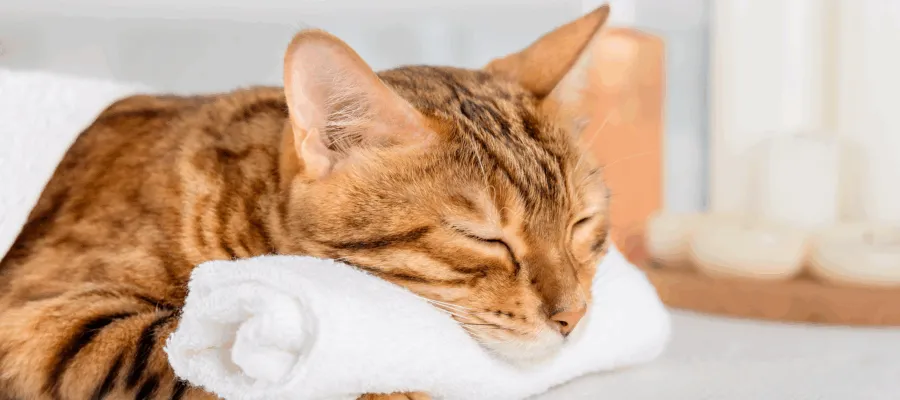How to Take Care of a Kitten: Ultimate Guide
Posted - July 10, 2025

By Carol Bryant, Professional Pet Blogger
You’ve got a new feline friend and are researching how to take care of a kitten. While that adorable face, tiny paws, and playful antics are part of your new kitten’s charm, there are things pet parents must do beyond cuddling and playing. From knowing what to feed her to preventing common health issues and having the right products in place, this guide covers the essentials of kitten care.
Kitten Basics: What They Need
Assuming your kitten enters your life at the appropriate 8 to 12 weeks of age, here’s a checklist to get you started on their proper care:
- Get established with a veterinarian
- Provide a litterbox and kitten-safe litter
- Provide a safe sleeping area
- Set out food and water dishes
- Feed your little one the best kitten food
- Provide enrichment toys and scratching posts
- Get your kitten used to a carrier
- Invest in proper grooming supplies
- Use vet-recommended products
- Start a health and behavior journal
Creating A Routine to Take Care of a Kitten
If you found a kitten or rescued an abandoned kitty that is less than 8 weeks of age, visit the ASPCA’s I Found Kittens Outside, What Do I Do helpful article to walk you through steps to save the little one.
If your kitten is at least eight weeks of age, here’s a guide to getting her routine off on the right paw:
Weeks 8-10
- Create a space that is safe, quiet, and secure.
- Establish feeding times using the proper kitten food.
- Begin gentle handling, brushing, and petting your kitten.
- Monitor her appetite, bowel movements, and litter box habits. (Pro tip: Take photos or videos of any concerns to show your veterinarian.)
- Avoid too much stimulation, don’t let her run around outside, and be careful about her delicate body and bones.
Weeks 11-16
- Begin basic socialization and play-based training.
- Expose your kitten to people, sounds, and textures indoors.
- Clip nails or allow someone experienced to do so.
- Use vet-approved products, including ZYMOX.
Months 4-6
- Continue with vet visits and vaccinations.
- Talk to your veterinarian about spaying or neutering
- Monitor teeth development and begin oral care. Kittens tend to chew and drool during this time, as their baby teeth emerge.
Months 6-12
- Continue with routines established.
- Continue regular vet care, ear cleanings, brushing, and grooming.
- Begin leash training if desired with an appropriate cat harness.
- Monitor for changes in stool, appetite, behavior, and weight.
- Redirect your kitten if she tries rough play or biting.
- Increase your kitten’s access to vertical spaces, such as cat trees or shelves.
Common Kitten Health Issues and Solutions
Because your kitten’s immune system takes time to build strength and develop, it’s imperative to keep an eye out for these five common kitten health issues:
Problem: Upper Respiratory Infection (URI). According to Dr. Lindsey Butzer, FHV-1 (feline viral rhinotracheitis) is the most common cause of URI in kittens and cats. Unfortunately, it can spread in shelters and multi-cat households.
Symptoms: Sneezing, nasal discharge, fatigue/lethargy, and occasionally oral ulcers.
Solution: Seek veterinary help for kittens who aren’t drinking or eating for 12-24 hours, have labored breathing or a persistent fever, seem to be in pain, and may have significant nasal discharge. A veterinarian will guide you through the treatment process, including any necessary medications, and likely suggest warmth, rest, hydration, and cleaning of the eyes and nasal discharge.
Problem: Ear Mites or Dirty Ears. Kittens may contract ear mites from their mother, other infected cats or dogs, and these infections are highly contagious.
Symptoms: Dr. Butzer says ear mite symptoms include intense scratching, rubbing the ear, dark or crumbly discharge resembling coffee grounds, red ear canals, scabs, or hair loss near the ears due to scratching.
Solution: Visit your veterinarian to confirm the ear mites. Most likely, your veterinarian will recommend that all pets in the household (dogs, cats, and ferrets) be treated. Use the prescribed medication. Once the issue clears up, use a non-toxic, enzymatic ear cleaner, such as ZYMOX ear cleanser, to soothe inflammation and remove debris. Keep a bottle of ZYMOX Enzymatic Ear Solution for Cats and Kittens on hand. The 0.5% hydrocortisone is ideal for itchy ears and inflammation.
Problem: Oral or Dental Issues. Between 3 and 6 months, kittens start to teethe.
Symptoms: They may experience bad breath, blood from the gums, or even retained baby teeth.
Solution: Always consult your vet if your kitten appears to have oral issues. The sooner you start at-home dental care, the better it will be for your kitten throughout her life. Introduce a daily oral care product, such as ZYMOX water additive, to naturally reduce oral bacteria. Include brushless options such as ZYMOX Oratene gel or breath freshener into your kitten’s daily routine.
Problem: Diarrhea or Loose Stool. Kittens may develop loose stool for several reasons, including dietary changes, parasites, side effects from medications, stress, infections, and other factors.
Symptoms: Accidents outside the litter box, mild lethargy, decreased appetite, and gas are all signs of diarrhea or gastric upset.
Solution: Never second-guess the cause, as your vet can help in this process. You’ll need to hydrate, feed a vet-approved bland diet, have your vet check for parasites, and keep an eye on your kitten’s stool.
Problem: Fleas or Skin Irritation. Fleas can lead to anemia, serious skin problems, and illness if left untreated. Skin irritation can develop as a result of fleas or for other reasons, such as itchiness, allergies, or improper shampoo use.
Symptoms: Constant biting or scratching the skin, black specks in the fur, hair loss, thinning patches, pale gums (emergency).
Solution: Be cautious about any products you use on or around your kitten, especially those under 12 weeks old. Your vet can instruct you on flea treatment and prevention as your cat grows, even if she is an indoor cat. For itchy skin, ZYMOX Topical Spray or Cream, applied to the affected areas with your veterinarian’s approval, may help. Consider ZYMOX Advanced Enzymatic Shampoo, which is gentle for delicate skin.
10 Fast and Fun Facts About Kittens
To close out our kitten care guide, here are 10 fun and interesting tidbits to teach you more about your little bundle of feline joy:
- Kittens should stay with their mother and littermates until about 8 to 12 weeks old, so they can wean, become social, gain independence, and be ready to transition to your care.
- Kittens knead with their paws, sometimes referred to as making biscuits, as a sign of contentment and happiness.
- Kittens gain weight at a rate of about four ounces per week, so most baby kittens are around one pound at four weeks of age.
- Like human babies, kittens are born toothless.
- A group of kittens is called a kindle.
- Kittens do not sweat like humans; instead, they release moisture through their paws.
- Most kittens are born with blue or blue-gray eyes, which will change to their permanent color within about a year (Siamese cats retain the blue color).
- Kittens can go into heat around five months old, making them capable of getting pregnant until they are fixed.
- Kittens have a highly keen sense of smell.
- Most kittens take their first steps 18 to 21 days after birth.
Here’s to a long, happy, healthy life with your kitten!

